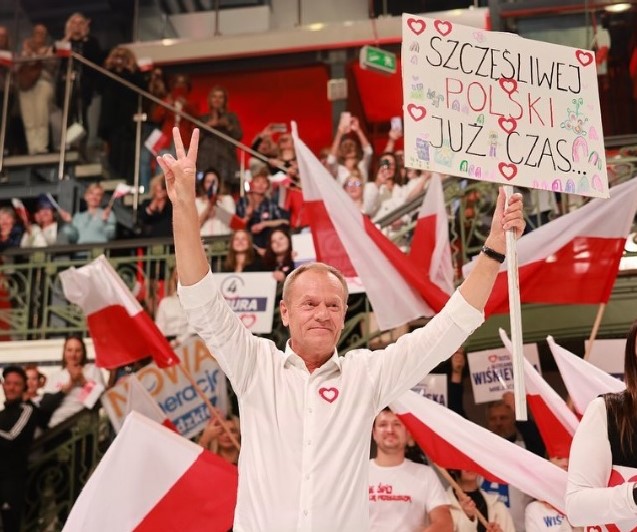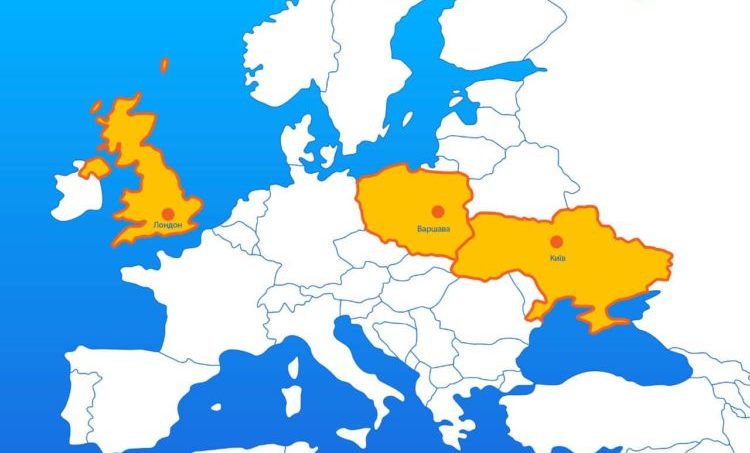Last Sunday, Poles elected deputies to the two chambers of parliament - the Sejm and the Senate. The election campaign, called the dirtiest in recent years, polarized Polish society to the utmost. The turnout was record high: 74.38%. This is 21 million Poles out of 29 million eligible voters.
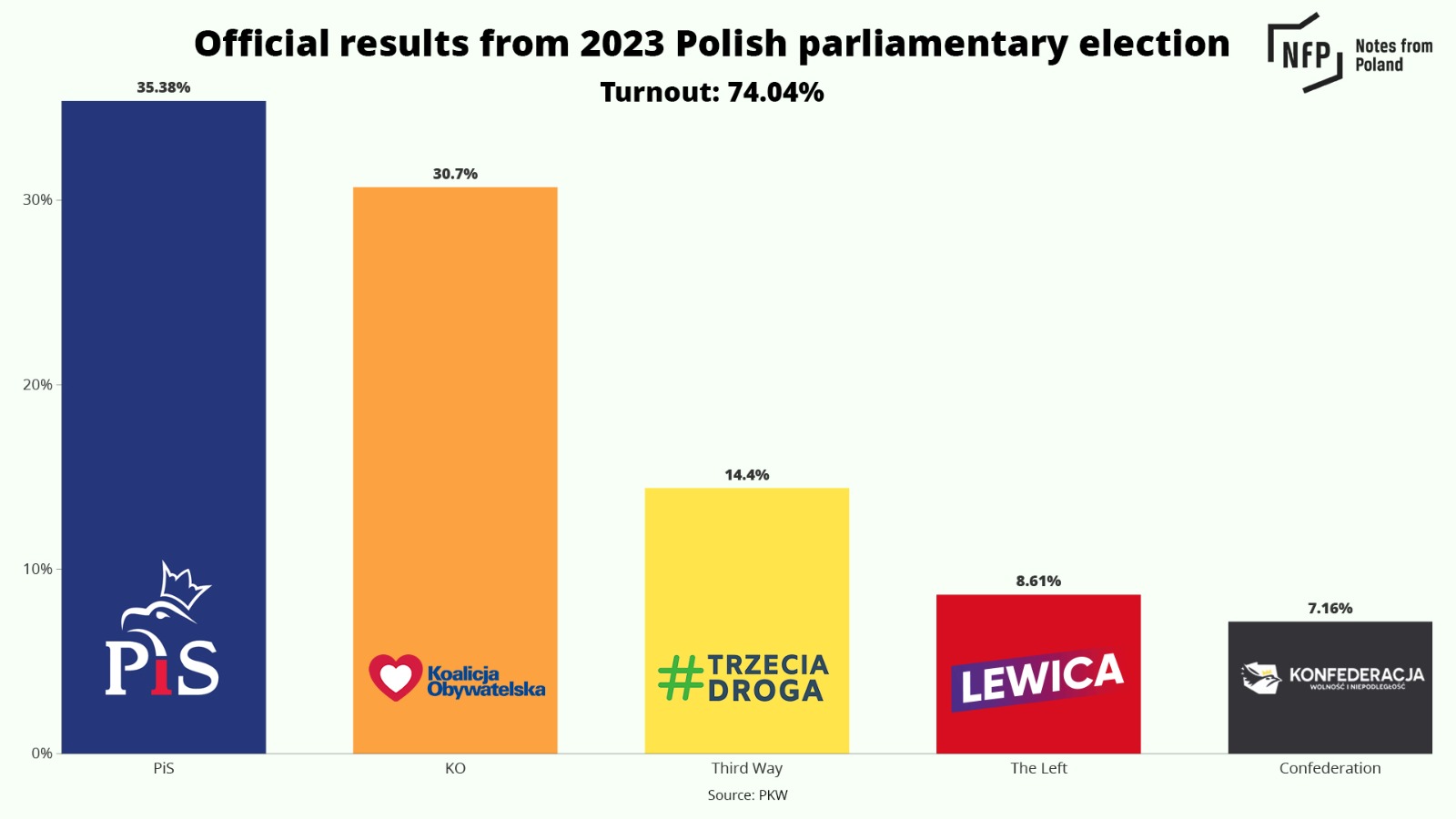
For the third time in a row, PiS (Law and Justice) came first in the Sejm elections. It received 35.38% of the votes, which gave this conservative political force 194 seats, out of 460 possible in the lower house.
The opposition catch-all political alliance Koalicja Obywatelska (Civic Coalition) received 30.70% of the votes (157 seats), the alliance Trzecia Droga (Third Way) - 14.40% (65 seats), Lewica (New Left) - 8.61% (26 seats). The far-right Konfederacja (Confederation) took 7.16% (18 seats).
Despite the largest number of seats won, the ability of PiS to form a government is in great doubt, even if they managed to negotiate with the far-right Confederation. Meanwhile, the rest of the political forces entering parliament categorically deny the possibility of joining a coalition with PiS.
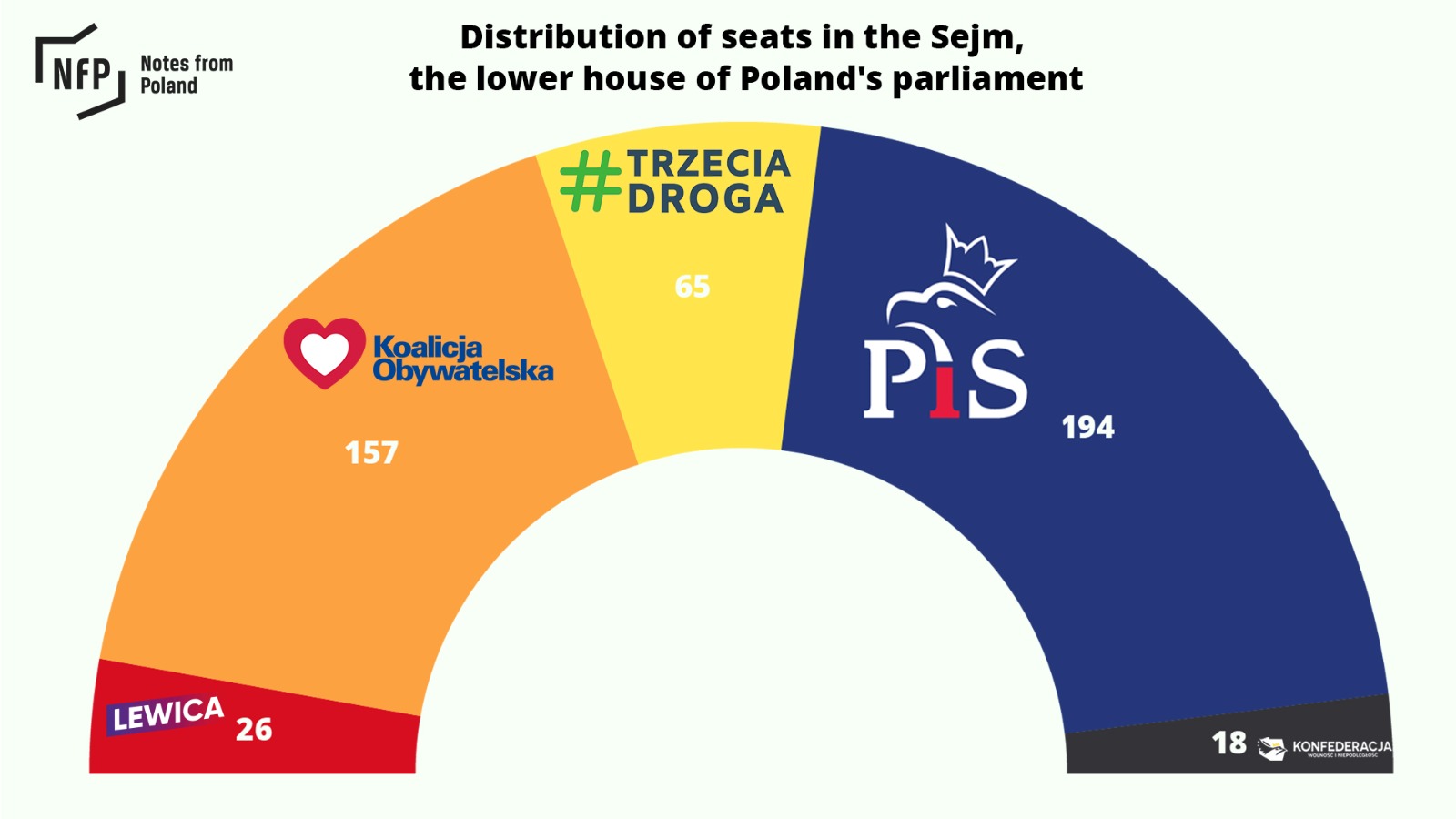
In turn, the creation of a centrist pan-European liberal-democratic majority in the Sejm by the Civic Coalition, Third Way, and New Left, which would have 248 seats, looks very probable. The results of elections to the upper chamber of parliament also confirm this.
The opposition forces adopted a joint list – the Senate Pact – and nominated one joint candidate from each district. This not only preserved the Senate majority, but also significantly strengthened it from the previous 51 seats to the victorious 65. Law and Justice (PiS) will have only 34 seats in the Senate out of a total of 100. The opposition has the most support in major cities. For example, Warsaw entrusted all four senate seats to candidates from the Senate Pact.
When will Poland get a new Government?
The incumbent Prime Minister Mateusz Morawiecki said that in order to form a new government, his political force Law and Justice (PiS) is ready to talk to everyone who shares their vision for Poland. However, for now, even the far-right Confederation has rejected such an option.
In fact, the leader of the ruling Law and Justice party Jaroslaw Kaczynski himself acknowledged defeat. Despite stating the fact of his political force's leadership in the third consecutive elections, he admitted that the question is whether this success can be "turned into yet another term of our government."
But as Kaczynski assured, whether in power or in opposition, they will continue to defend Poland's independence and "the right to determine its own fate." Behind this rather vague phrase lies a reference to the contradictions between Poland and the European Union, which in the last five years have reached a critical level.
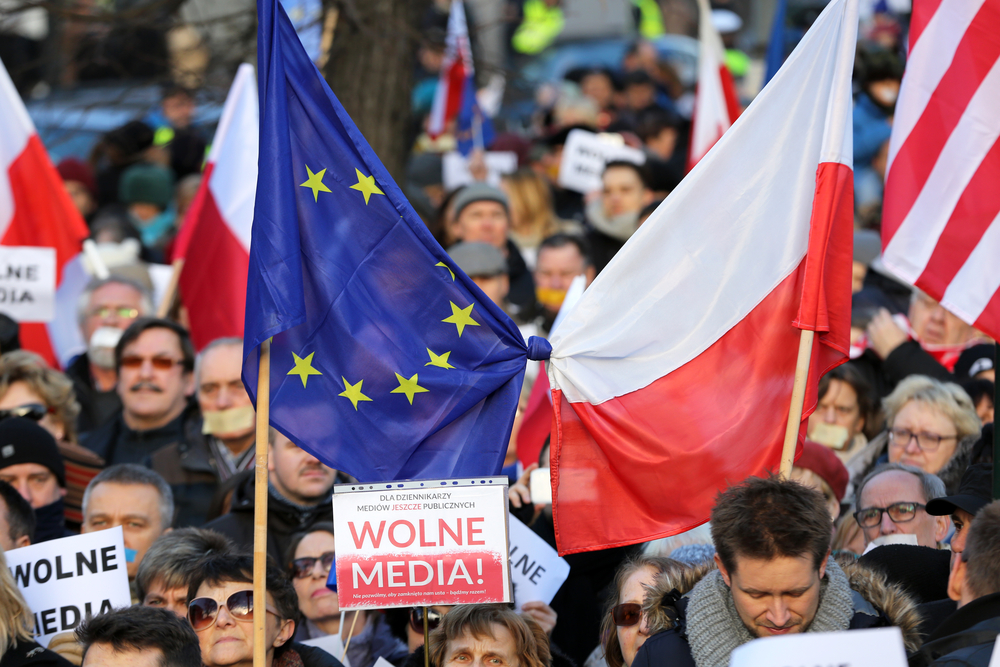
How events will unfold further largely depends on the incumbent President of Poland Andrzej Duda. According to law, no later than a month after the elections, he must convene a session of the Sejm, and within the next two weeks instruct the representative of the winning party to form a government. This government must be formed within another two weeks.
The opposition calls on the President not to delay the transfer of power and give them the opportunity to form a government as soon as possible. According to potential Prime Minister Donald Tusk, leader of Koalicja Obywatelska (Civic Coalition), the Polish opposition forces "are ready to take responsibility for governing the country at any time."
Former President of Poland Bronislaw Komorowski also expressed hope on Polsat News that the current President of Poland Andrzej Duda will recognize the democratic verdict and not delay the election of a new government: "He can afford to be more independent from his political camp."
Opposition ready for prolonged struggle
The democrats have no illusions and are ready for a prolonged struggle. “PiS will be a strong opposition. I'm afraid the coming years will be full of political chaos," said renowned Polish director Agnieszka Holland in an interview with Rzeczpospolita. "We need to change politics, create a new way of functioning in it, a new political narrative to avoid clashes and deal with important things."
Former President of Poland Aleksander Kwasniewski is convinced that the election results should give Tusk the position of Prime Minister. To this end, all parties of the future coalition must ensure the speed and effectiveness of negotiations in order to avoid problems that will be exploited by the current PiS government. In a conversation with RMF 24, he expressed the opinion that the task of the future prime minister is also "Polish-Polish reconciliation," since Poland is currently very polarized:
"The language used by government representatives must be a language of mutual respect. Someone has to break this circle of mutual hatred, accusations, obscenities... Donald Tusk can do it because he is an experienced and delicate politician."
It should be noted that the very fact of forming a new centrist government does not automatically mean the successful implementation of socio-political changes in Poland. The incumbent President Andrzej Duda, who is a representative of the ruling Law and Justice party, will remain in power until 2025 and will be able to veto laws of the new government. Whether he will be able to be an independent arbitrator and put state interests above party interests remains an open question.
Why Poles want change
The majority of Poles effectively voted against Law and Justice. The party is not without reason accused of upsetting balances in order to gain more control over state institutions, courts, public media, as well as over the electoral process itself. A third term of this political force would have meant the actual consolidation of its power and the transformation of Poland into a country with formal democracy.
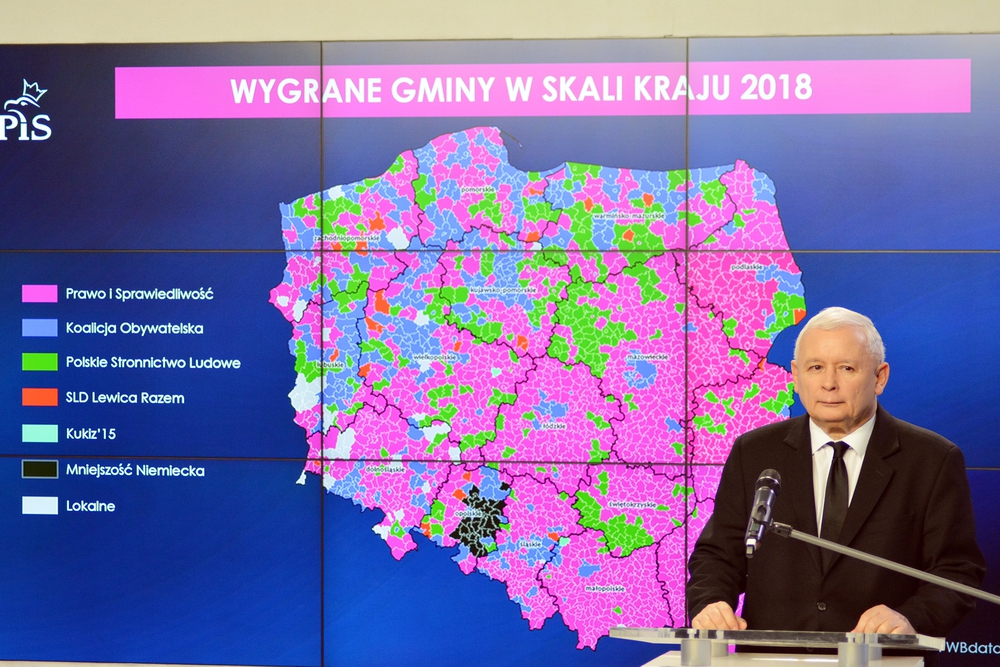
The Poles' resistance was also provoked by PiS’ clerical approaches to defining the role of women in society, the almost complete ban on abortions, low tolerance for “otherness” in its various contexts, and Euroscepticism.
The new government will have a lot to change in order to restore Poland's independent judicial system, free media, and reduce the level of aggression and polarization of society that arose as a result of the active confrontation between different political forces over the past eight years.
Poland-EU-Ukraine: the end to misunderstandings?
Donald Tusk, who may head the new government of Poland, is one of the most prominent and authoritative politicians in modern Europe. The former President of the European Council and President of the European People's Party can be expected to turn Poland 180 degrees from Euroscepticism to active participation in reforming and developing the European community, settling contentious issues with the European Commission, and returning to European values.
Ukraine also benefits from this: reform within the EU is an important factor in accelerating its European and Euro-Atlantic integration.
One should also hope for a general warming of relations between Ukraine and Poland, reducing tensions around historical and economic issues, and continuing support for Ukraine in the war - all parties and blocs that will enter the new coalition spoke out for this.
The decrease in the influence of Polish right-wingers on foreign policy also makes it impossible to create a dangerous Eurosceptic coalition between Poland, Hungary, and Slovakia. Thanks to this, the negative impact of the latter two on EU policy and Ukraine's European integration will be largely neutralized.
Also worth recalling are the special sympathies of the Polish right for President Donald Trump and the political force he represents. In the event of Trump's return to the US presidency, it is possible that Law and Justice would take into account his view on ways to end the war in Ukraine, which is undesirable for Ukraine itself.
So, the next two months will be crucial for Poland and will determine the further vectors of European and Euro-Atlantic policy.
Related:
- Poland stops supplying weapons to Ukraine amid grain dispute
- Poland to stop aid for Ukrainian refugees in 2024, official says
- Grain dispute: how Poland and Ukraine can reach a solution

